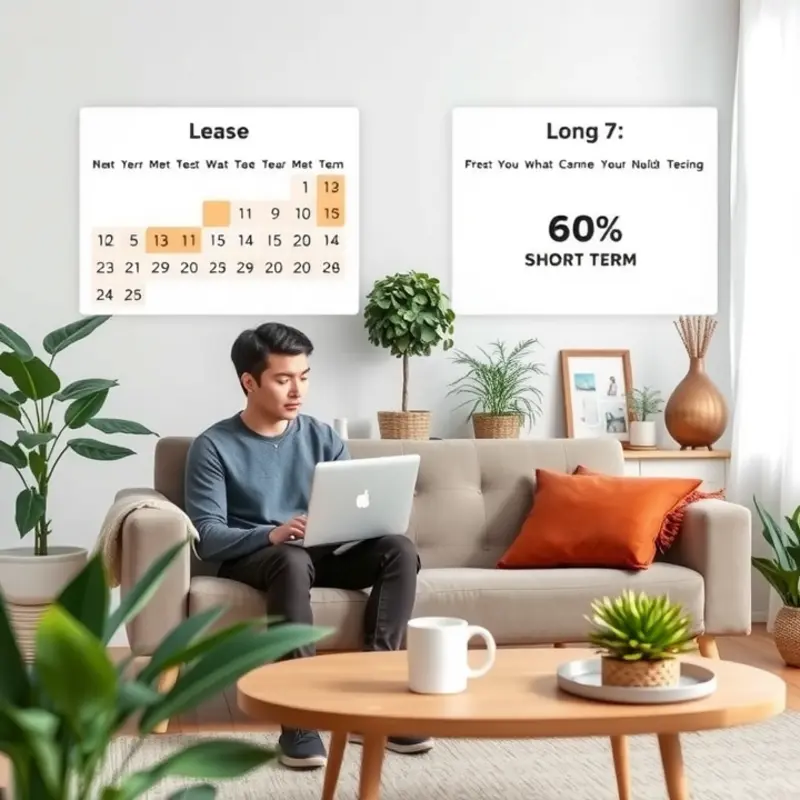Finding the perfect rental can be challenging, especially when it comes to understanding lease lengths. Whether you’re a young professional venturing into the rental market, a student balancing budgets, couples starting a family, or families seeking stability, nailing down the right lease length is crucial for financial clarity. Shorter leases offer flexibility but can lead to higher costs upon renewal, while longer leases provide security but may hinder future opportunities. Navigating this decision involves understanding your current needs, future plans, and the dynamics of the rental market. This guide is designed to empower you with the insights needed to negotiate lease terms that best suit your lifestyle and budget, ensuring that your rental experience supports your goals rather than complicating them.
Understanding Your Needs: Short vs. Long Leases

Deciding between a short-term and a long-term lease can have significant impacts on your living situation and financial well-being. Each lease type has its unique set of benefits and potential drawbacks that you should consider carefully aligning with your personal circumstances.
Short-term leases, generally ranging from month-to-month to less than a year, offer flexibility. This is ideal if you anticipate changes in your life, such as job relocation or pursuing new educational opportunities. Short-term commitments allow you to pivot quickly without the financial burden of breaking a lease. However, this flexibility often comes with higher rental rates, which can add up over time. There’s also the risk of sudden rent increases when renewing.
Understanding your job stability is crucial in this decision. If you’re in a position with little security or are considering a career change, a short lease might provide the necessary adaptability. Conversely, if your job is stable and you plan to stay in the area long-term, a longer lease might be more advantageous.
Long-term leases, typically spanning one year or more, offer stability and often come with lower monthly rates. This can be beneficial for budgeting and is typically less hassle, as you won’t need to frequently negotiate renewals or move. However, long-term leases can be restrictive if unexpected life changes occur. Breaking a lease can lead to significant financial penalties.
Consider your financial goals as well. If you are aiming to save money, a long-term lease often provides a lower monthly cost, allowing you to allocate your funds elsewhere. Be mindful, though, that it locks you into a fixed location. If future life events—such as starting a family or seeking growth opportunities in another city—are on your horizon, a short-term lease could provide the flexibility you need.
Moreover, evaluate the possible impact of life changes. Anticipate your near-future plans and how changing apartments might affect them. For example, renting near a university might make sense if you are a student or planning to attend classes. Short leases can be found near educational institutions, allowing for transition as your educational tenure ends. For more insights, consider exploring apartments near the University of Texas, which often accommodate varying lease terms designed for student lifestyles.
Ultimately, the right lease length depends on a balance of personal circumstances, future plans, and financial considerations. Carefully weighing the pros and cons of each option will help ensure you secure a rental agreement that aligns with your lifestyle aspirations and financial peace of mind.
Negotiation Tips: Securing Your Ideal Lease Length

Understanding the art of negotiation is crucial when securing your ideal lease length. Approach this task equipped with a solid understanding of market trends. Research local rental markets to gauge average lease lengths, popular terms, and any emerging shifts. This knowledge serves as valuable leverage when discussing terms with potential landlords.
Competing rentals often present an opportunity to negotiate better terms. Look at similar properties in the area to identify favorable conditions elsewhere. If multiple landlords offer similar properties, you can use this information to your advantage. Highlight the competitive offers to demonstrate why they should consider adjusting their standard lease terms to accommodate your needs.
Clear communication is key in any negotiation. Begin discussions by expressing sincere interest in the property while also vocalizing your lease preferences. Be honest about your ideal duration, whether it’s a six-month trial or a more extended stay beyond the standard one-year period. Clarity about your intentions helps landlords better understand your position and may make them more receptive.
When negotiating, it is essential to know what to ask for. Start with the lease length that best fits your lifestyle. If the standard term doesn’t suit you, inquire about alternative options such as month-to-month leases after an initial period. You might also negotiate for a shorter commitment with an option to renew, providing flexibility as your circumstances evolve.
It’s not just about the length; consider requesting specific accommodations that complement your lease term. Reduced penalties for early termination or the possibility of subletting can be worth negotiating, especially if your life circumstances are subject to change.
For those new to renting, it might be beneficial to improve your renter’s profile. A strong renter credit score can work in your favor during negotiations. Read our renter credit improvement tips to bolster your standing and reinforce your negotiating position.
Finally, remain prepared to walk away if the terms aren’t right. Knowing your deal breakers ahead of time helps you stay focused on finding a lease that aligns with your priorities. Remember that negotiation is a two-way street—both you and the landlord should feel satisfied with the agreement for a harmonious rental experience.
Final words
Choosing the right lease length involves a balance of personal needs and market realities. Whether you opt for the flexibility of a short lease or the stability of a long one, understanding your situation and negotiating with confidence will pave the way for a smooth renting experience. By considering both your present circumstances and future aspirations, you can secure a lease that aligns with your financial objectives and lifestyle preferences. Now, take the knowledge gained here and approach your rental negotiations with clarity and confidence, ensuring that your living situation supports your journey forward.









